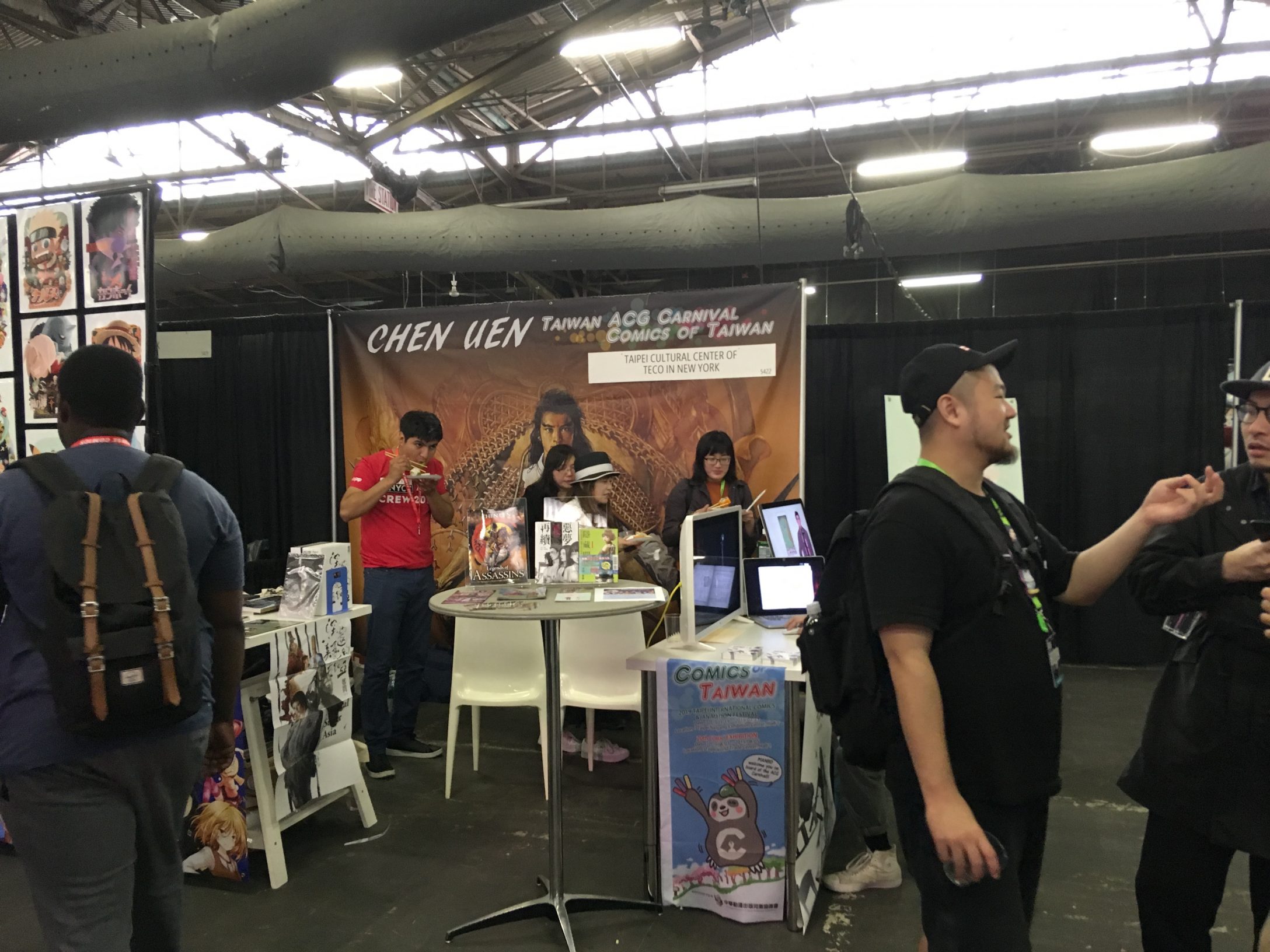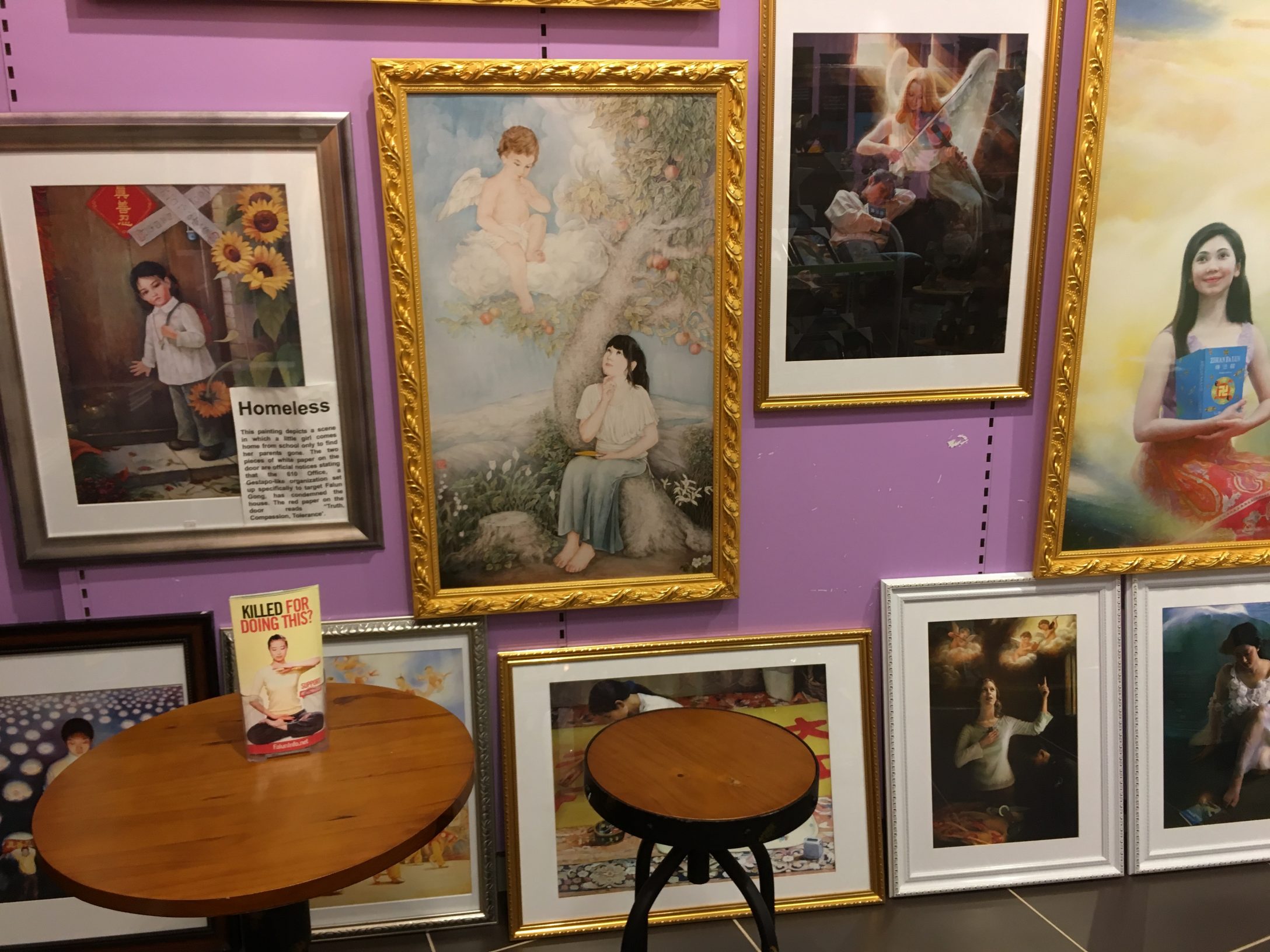It’s funny. The entire time that Donald Trump has been president, I’ve only returned to America three times, though I’ve spent most of my life there. Most recently I went back to New York, for the first time in two years, to talk on a panel about Taiwanese video games at Comic-Con and visit friends and family. Every time, a part of me expects to encounter a Mad Max-style post-apocalyptic landscape. This hasn’t happened… yet. But it was Trump’s face that greeted me at customs at JFK—his official White House portrait, mounted on the wall.
 Brian Hioe
Brian HioeNew York and Taipei, my two homes, are exactly twelve hours apart, so at any given time I can always find someone to chat. The adjustment for the time lag is easy for me as well, since I’m a night owl.
Over the two weeks of my visit I commuted between upstate and New York City most days, sometimes getting stuck in traffic for up to three hours. I ended up in what sometimes seemed like a hellish samsara of meetings, coffee, food, and drinks, and I got sick.
A few times I missed the last bus back and, not wanting to spend money on a hotel, I would just stay out all night. Having become interested in underground electronic music during my last two years in Taiwan, and also hoping to explore the New York scene, sometimes my solution was to find an underground club and try to either sleep on a couch, or dance the night away. But if I tried to sleep, people would come by and tap my shoulder to ask if I was okay. There were at least three days over the two weeks in which I just powered through twenty-four hours awake, sometimes very, very hungover or after an all-night dance session. I may sleep very little compared to most people, but that was tough even for me!
I found there were more empty storefronts in New York City, some which had been empty since I left, two, nearly three years ago. The MTA, always bad, had somehow become even worse. In Orange County, where I grew up in upstate New York, the Falun Gong—who are basically present anywhere in the world there is a large diasporic Chinese population—now owned a store in the local shopping mall.
When I left, there was a large, perpetually empty Chinese supermarket the Falun Gong were rumored to own as a money laundering operation. At the large outdoor shopping outlet where she worked, my mother told me, the growing number of Chinese tourists meant that more Chinese store clerks were being hired—including many members of the Falun Gong. These Falun Gong clerks would whisper things under their breath to Chinese tourists while ringing up their purchases, such as , “Quit the party!” (退黨!) Chinese tourists, who were in most cases not members of the Chinese Communist Party, found this behavior unnerving.

The lack of decent New York pizza in Taipei is so absolute as to be the object of a public feud. The Taiwanese-American rapper Miss Ko, who is from Queens, made a diss track about a Taiwanese-American-owned pizza restaurant’s lack of authenticity, which samples heavily from the third movement of Mozart’s Requiem. If I were to translate it into English, the refrain goes:
I’ve never had such bad pizza
Pizza pizza pizza
And you even have the nerve to use New York’s name
Pizza pizza uh
It tasted like snot (Jesus)
You should give me thirty percent off
Not to start another feud among the diaspora, but I find this about as ridiculous as it sounds.
There are deep, longstanding connections between Taipei and New York. During the authoritarian period, Taiwanese political dissidents maintained a safe house in New York City that doubled as a secret library stocked with books forbidden in Taiwan. An attempt to assassinate Chiang Ching-Kuo, the son of Chiang Kai-Shek and his successor as the dictator of Taiwan, took place outside of the Plaza Hotel in 1970.
New York is a recurring figure in many seminal Taiwanese books and films, particularly those concerned with waishengren, the 10% of Taiwanese whose families came to Taiwan with the Kuomintang following their defeat in the Chinese Civil War, and who came to constitute a privileged ruling class during the authoritarian period.
Pai Hsien-Yung’s New Yorkers draws on Pai’s experiences as a graduate student in America; Pai’s book Taipei People is a seminal depiction of waishengren marooned in Taipei after the Chinese Civil War. Taiwanese New Wave filmmakers, who were mostly waishengren, also set films in New York, like Ang Lee’s The Wedding Banquet and Pushing Hands. The recent Taiwanese animated film, On Happiness Road, is also partly set in New York, though it is one of the few works to spotlight the New York Taiwanese diasporic experience from a benshengren perspective, benshengren being the roughly 89% of Taiwanese whose families settled in Taiwan during the earlier waves of Han migration.
You’d be surprised sometimes at the influence of the New York Taiwanese diaspora in America. One story goes that the ubiquitous American Chinese dish, General Tso’s chicken, really originated with Chiang Kai-Shek’s chef in Taiwan, who made up a story about the dish having been invented by Qing dynasty general Tso Zongtang in order to impress Chiang. The dish then spread to New York when this chef moved to New York, and thence to the rest of America. On the other hand, you’d be hard pressed to find a Taiwanese restaurant that serves General Tso’s chicken in Taiwan today. (Actually, ironic as it is, American Chinese food actually came to be one of the American foods I missed the most in Taiwan.)
People all around the world are captured by what they imagine to be the marvels of New York City, and I suppose I’ve been there, too, particularly when I was younger. Maybe I was a bit arrogant in college, but I remember thinking that after all those years in upstate suburbia, I was in the center of the world. Nothing mattered of the world outside of New York City, except maybe other world capitals such as London, Tokyo, Berlin—those kinds of places.
Even now, living in Taipei, sometimes I’ll encounter people who seem to look down on me for living in the “periphery” and not the “center,” living in a small country which isn’t even acknowledged as a country, or in a small city, though it is the capital of the country. Some take the view that I’m wasting my talents in what is fundamentally the “periphery”; others just look down on me, plain and simple.
Taiwanese people often ask me why I decided to live in Taiwan when so many people spend so much time and energy trying to get out. Sometimes they see leaving as part of a process of moving up in the world. Taiwanese people are always telling me that Taiwan is small, that it’s “boring,” and insist that there have to be so much bigger, more interesting things in the world than what there is in Taiwan. It seems inexplicable to them someone who would do the opposite, and move from the “international world” to Taiwan.
In some ways, their views are understandable. Taiwan may be a first world country in many respects, but it is a third world country in others, and oftentimes the third world is still considered to be aspiring toward the first world. Over the years I’ve become increasingly aware of how much of my reputation in Taiwan is built on the knowledge of my New York upbringing and the social capital that lends me, as is the case with more than one public figure.
But as I grew up, I came to see New York City as a place full of people caught up in a set of delusions all too particular to New York. New York’s claim to be a “center,” or even the center of the world, seemed to mask a highly insular view of life. It reminded me of the idiom from Zhuangzi, of the frog in the bottom of the well who thought that his well was the world.
New Yorkers were always caught up in micro-trends that existed nowhere else except New York City—whether with regard to books, films, or food, or anything else. With so much of cultural production focused upon New York, à la the whole MFA-versus-NYC debate in the field of literature, so much of the world was being missed out on.
New York also felt like an increasingly powerless place to me, where vast amounts of the world’s wealth are concentrated, yet even basic public infrastructure couldn’t be maintained, and in which the wealth of a few masked a growing avalanche of urban poverty. It was all the more absurd that this very opulence is what people usually focus on in their idealization of New York. After being caught up in the 2014 Sunflower Movement, and experiencing a political context in which people were able to take and wield political power, a key motivation for my moving back to Taiwan is that I thought I would be able to participate more meaningfully there.
I could have stayed and fought in New York, too. But eventually it felt constraining, and I had to get out. The notion of New York as a confinement, like in the film Escape from New York, in which walls are built around Manhattan to turn it into a maximum security prison, sometimes seemed reflected in reality to me. In the end, like many people, I guess I have a love-hate relationship with New York.
There’s a song called “Taipei-New York”, which, for me, epitomizes the romanticization of New York in Taiwan. In English, the lyrics for the first verse go:
I’m not used to walking into a coffee shop alone
With a heart that flutters back and forth, I wait for you, but you don’t come
When Taipei gets off work, it is early morning in New York, I walk alone on a street
Finally returning to a single person’s room
Feeling a bit tired, finding a few boring letters; in midnight Taipei, it’s busy in New York
OH~DA LA DI LA~DI LA DA~
It’s hard to decide if this song makes me want to cry or vomit.






